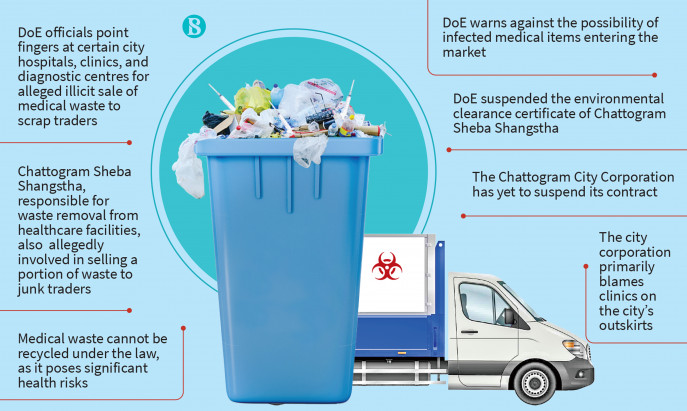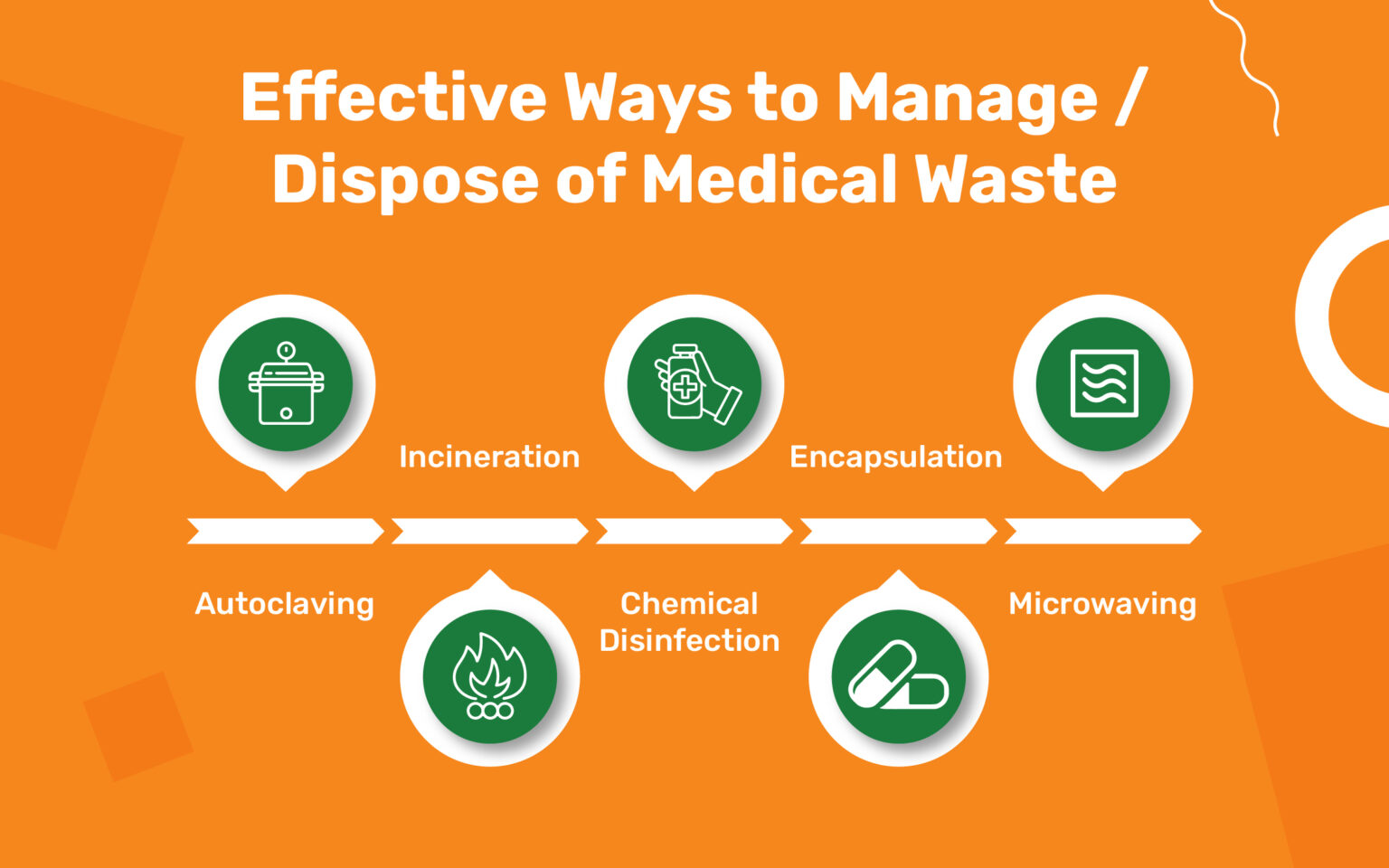Stay Ahead of Regulations: Expert Recommendations on Medical Waste Disposal
In a globe where the healthcare industry is frequently developing, it is critical for medical facilities to remain ahead of regulations when it concerns the correct disposal of clinical waste. With stringent guidelines and regular regulatory modifications, it can be challenging to browse the complexities of this process. With expert guidance, facilities can ensure conformity and alleviate risks connected with improper waste disposal. From understanding the different classifications of clinical waste to carrying out the right collection and segregation methods, this discussion will offer beneficial insights and actionable pointers to help centers remain ahead of regulations in the ever-changing landscape of clinical waste disposal.
Comprehending Clinical Waste Categories
Understanding clinical waste categories is necessary for correct disposal and administration in medical care facilities. Medical waste describes any kind of waste produced by health care activities that might pose a danger to public health and wellness or the atmosphere. It is critical to categorize clinical waste properly to ensure its risk-free handling, disposal, transportation, and treatment.
There are numerous categories of clinical waste that health care facilities need to be acquainted with. The most usual classifications include transmittable waste, pathological waste, sharps waste, pharmaceutical waste, and chemical waste. Each category has specific standards and guidelines for its proper administration and disposal.
Infectious waste includes products polluted with blood or various other physical fluids, such as gloves, gowns, and laboratory societies. Pathological waste refers to human tissues, body organs, or body components that call for special delivery and disposal. Sharps waste includes utilized needles, syringes, and various other sharp objects that can cause injury and transmit infections. Drug waste makes up ended, unused, or polluted drugs that require cautious handling and disposal. Lastly, chemical waste includes solvents, disinfectants, and other chemical substances used in healthcare centers.
Staying Up-To-Date With Regulatory Modifications
Staying existing with governing adjustments is vital for medical care facilities to make sure compliance and proper administration of clinical garbage disposal. medical waste removal. With guidelines regularly developing, it is necessary for health care centers to stay current to prevent penalties, penalties, and prospective injury to the environment and public wellness
To stay in advance of regulative modifications, medical care centers must establish a system for tracking and tracking updates. This can be done by signing up for regulatory e-newsletters, going to workshops and conferences, and actively joining sector organizations. Additionally, facilities should mark a team member or group in charge of staying educated and distributing details to relevant stakeholders.
Normal interaction with regulatory agencies is additionally vital. Health care centers ought to establish partnerships with neighborhood, state, and government firms to guarantee they know any type of modifications in policies that may impact their waste administration methods. This can be done with routine conferences, involvement in public remark periods, and aggressive involvement with regulatory companies.
In addition, medical care centers need to think about partnering with waste management companies that concentrate on medical garbage disposal (medical waste disposal services with WasteX). These companies are usually well-versed in the most current guidelines and can provide support and support to make sure compliance
Executing Correct Collection and Segregation Approaches
To effectively take care of medical garbage disposal, medical care centers have to develop appropriate collection and segregation approaches based on regulatory guidelines. Carrying out these approaches makes certain the risk-free handling and disposal of possibly harmful materials, shields the atmosphere, and reduces the threat of infections and injuries to medical care workers and the basic public.
Proper collection and segregation approaches involve the usage of marked containers and identifying systems. Medical care facilities should provide plainly classified containers for different kinds of clinical waste, such as sharps, contagious waste, pharmaceutical waste, and non-hazardous waste. These containers ought to be color-coded and plainly significant to prevent complication and advertise easy recognition.
Furthermore, healthcare centers should train their personnel on the appropriate treatments for gathering and setting apart clinical waste. This consists of educating them on the various kinds of waste, the suitable containers to utilize, and the importance of adhering to standards and laws. Normal training sessions and correspondence course should be carried out to make sure that personnel continue to be current on ideal practices.
Furthermore, health care centers ought to develop a system for normal collection and disposal of medical waste. This may include partnering with licensed waste monitoring business that concentrate on medical garbage disposal. These companies will make sure that the gathered waste is carried and dealt with in conformity with regulatory needs.
Picking the Right Disposal Approaches

Incineration is just one of the most common and reliable approaches for throwing away particular kinds of medical waste, such as pathological waste and sharps. It company website involves the regulated combustion of waste at heats, decreasing it to ash. Nonetheless, incineration can release harmful pollutants right into the air and add to air pollution.

Various other disposal techniques include chemical treatment, microwave treatment, and landfilling. Chemical therapy includes making use of chemicals to decontaminate and reduce the effects of the waste. Microwave treatment utilizes microwave energy to warm and decontaminate the waste. Landfilling includes burying the waste in a designated garbage dump area (medical waste disposal services with WasteX). Landfilling needs to be the last hotel due to the possible danger of contamination to dirt and groundwater.
Guaranteeing Compliance Via Paperwork and Training
After very carefully thinking about the appropriate disposal methods for pop over to this web-site clinical waste, health care facilities should guarantee compliance with policies and reduce environmental influence by executing efficient paperwork and training treatments. This step is crucial in keeping a risk-free and lasting setting for both healthcare workers and the general public.

Training is similarly important in making certain conformity with policies. Health care workers that take care of medical waste needs to get appropriate training on waste partition, managing, and disposal procedures. This training needs to cover subjects such as the proper use personal protective devices, recognition of various kinds of waste, and the correct disposal methods for each waste category. By providing detailed training, health care facilities can encourage their team to make informed choices and minimize the threat of inappropriate waste disposal.
Conclusion
To conclude, remaining in advance of regulations in clinical waste disposal is important for medical care facilities. medical waste removal service. Recognizing the various groups of clinical waste, remaining updated with governing modifications, carrying out proper collection and partition methods, selecting the appropriate disposal approaches, and guaranteeing compliance through documentation and training are all important steps. By following these standards, healthcare companies can efficiently take care of and get rid of of clinical waste in a accountable and secure fashion
From understanding the various categories of medical waste to executing the ideal collection and segregation techniques, this conversation will certainly provide beneficial insights and workable ideas to aid facilities remain ahead of laws in the ever-changing landscape of clinical waste disposal. - medical waste disposal services with WasteX
The most usual classifications consist of transmittable waste, pathological waste, sharps waste, pharmaceutical waste, and chemical waste. Medical care centers need to give plainly classified containers for different kinds of clinical waste, such as sharps, transmittable waste, pharmaceutical waste, and non-hazardous waste. Medical care facilities ought to develop a comprehensive system to tape and track all facets of medical waste disposal, including kinds of waste generated, quantities, and disposal techniques utilized. Medical care employees who deal with clinical waste needs to obtain ideal training on waste segregation, handling, and medical waste disposal services with WasteX disposal procedures.